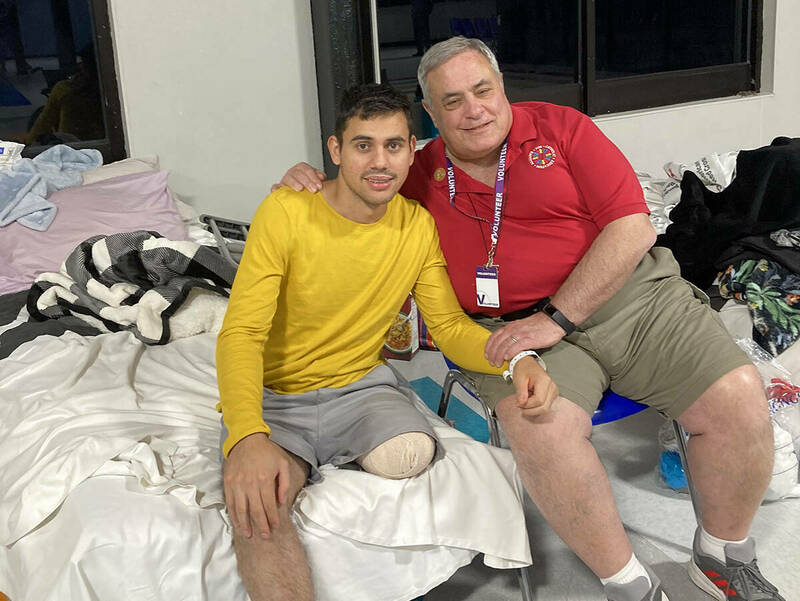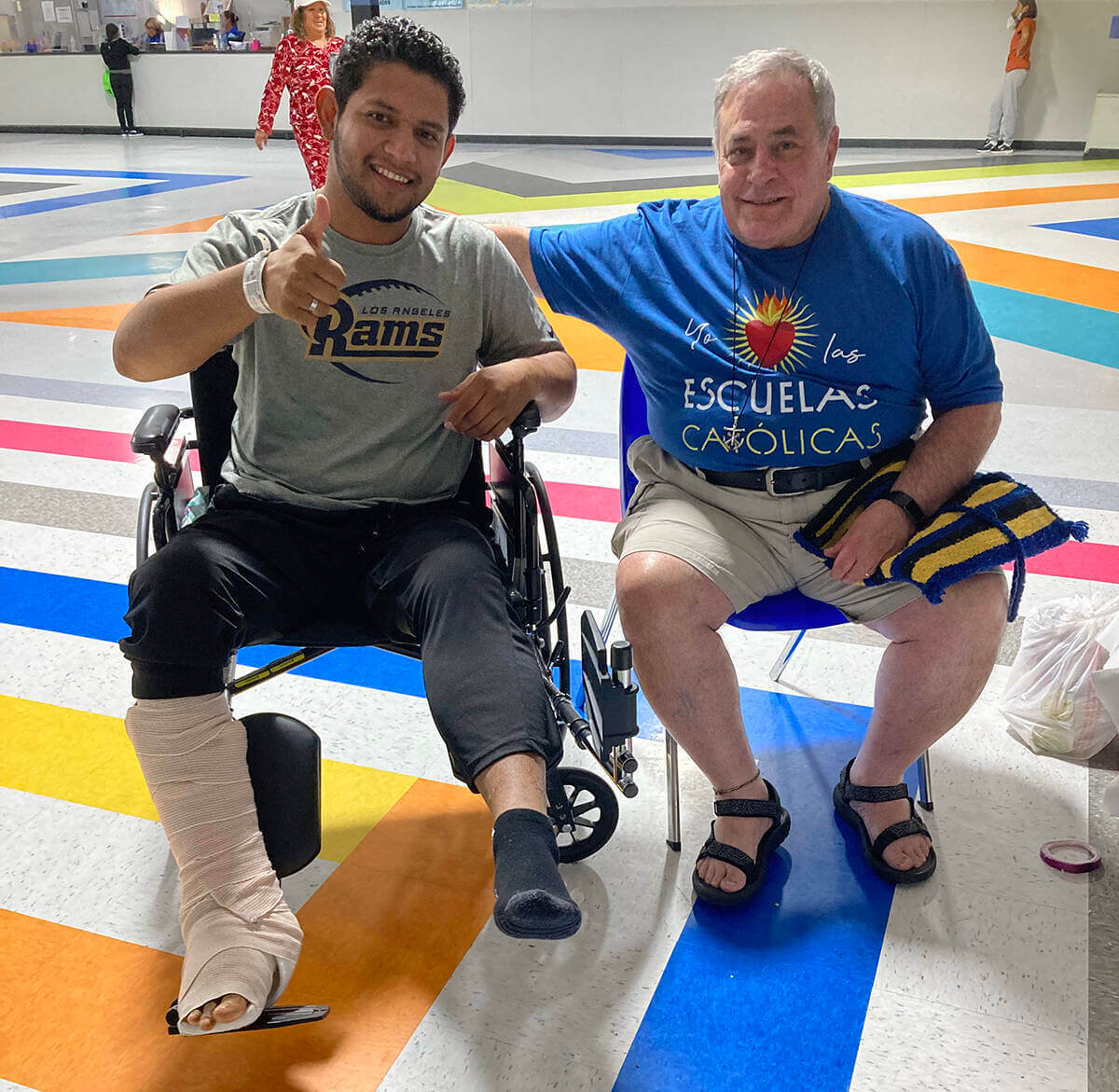 “I saw a leg fly up in the air and land somewhere, though I didn’t even know it was my leg, until I tried to move and I could not,” Gabriel told Father Corpora.
“I saw a leg fly up in the air and land somewhere, though I didn’t even know it was my leg, until I tried to move and I could not,” Gabriel told Father Corpora.
I noticed two guys in wheelchairs coming into the Humanitarian Respite Center in McAllen, Texas, near the U.S.-Mexico border. One had his left leg amputated above the knee. The other had both legs supported with all sorts of braces and wraps. I wondered how they possibly could have come from somewhere in Latin America in those wheelchairs.
Talking to them while I served dinner, I learned that they — Gabriel and Monra — were survivors of an incident on May 7 when an SUV driver plowed into a group of people in Brownsville, Texas. I spoke with one of the men at length. He told me what it was like.
The people were sitting on the curb waiting for a bus to San Antonio. Gabriel and Monra hoped to find a couple days’ work to earn plane fare to cities where they had family waiting for them. Out of nowhere, this man in an SUV left bodies strewn around the street. Seven people died on the spot. Another died upon arriving at the hospital. Four are still hospitalized. After weeks of treatment for their traumatic injuries, Gabriel and Monra made it to the humanitarian center run by Sister Norma Pimentel, M.J., on June 1.
I couldn’t imagine their trip from Venezuela to the United States on foot, buses and trains, or the dangers they encountered along the way. At the border they were not allowed to cross for months. Finally, after so many hardships and setbacks, they made it safely and prepared to look for day labor to support their journey onward.
Only then did they suffer a life-changing accident, two men who had not crossed paths before meeting at a migrant shelter in Brownsville now intertwined in tragedy. As Monra told me his story, I cried. Who would not? Monra said to me, “Pues asi lo quiso Dios.” This was God’s will. I told Monra that I cannot believe in a God who would want this for his people.
The next day, I spent an hour talking with the two men again. Gabriel had his leg amputated above the knee. Monra’s prognosis suggests he will recover and walk again, God willing.
Gabriel left Venezuela because there was no work. No work means no money means no food. When the SUV struck, he was on FaceTime with his wife and two boys in Venezuela.
“I don’t know what happened. People were screaming and yelling. All of a sudden, I felt tremendous pain. I saw a leg fly up in the air and land somewhere, though I didn’t even know it was my leg, until I tried to move and I could not,” he said. “Luckily another guy ripped off my t-shirt and used it to make a tourniquet to stop the blood gushing out of my body.”
The pain was intense, but Gabriel told me that he never lost consciousness. He was rushed to a hospital in Brownsville, but after five minutes he was taken to a hospital in Harlingen.
Gabriel looks like an athlete. He told me has played soccer all his life. “Now, I will never play soccer again,” he said.
I asked him if he has hope for the future. “I have to have hope for my children. They need their father. I don’t want to let them down. I will have to figure out how to be a good father to them.”
I asked him if he has nightmares. “No, not yet.”
He has tremendous pain in the amputated leg. I have heard of this before. I think it’s called “phantom pain.” In Spanish, it’s “dolor de fantasma.” The entire time that he talked, he rubbed the area where his leg ends, wincing in pain.

At one point he had to go to the bathroom. I pushed him there in his wheelchair. I fully expected that he would need help standing up to urinate. Instead, he used both arms of the wheelchair to push himself up and held onto the urinal dividers. I was amazed at his energy, his willpower, his desire.
And the same for Monra. He has learned how to go to the bathroom in his wheelchair. It’s amazing how they are coping.
Their futures are so unknown at this point. Where will they go? Who will take care of them? How will they get money? Will Gabriel get a prothesis? So many unanswered questions.
I know that God gives us the grace for whatever we need. I don’t doubt this. But I cannot imagine myself in a situation like this. I don’t know if I would want to continue. I would have to dig very deep inside of myself to find the strength to keep going.
When I left the Respite Center that day, I played the “what if?” game. What if their journey from Venezuela had taken one fewer day? Or one day more? What if they had spent just a little more or less time in limbo at the border? What if they had been standing in a different place among the 30 people at the bus stop so that the SUV missed them? Like so many of life’s tragedies, there are no answers to these questions.
When I returned to the Respite Center the next day, Gabriel told me that he wanted to shower. In preparation, he took off his bandage and I saw the stitches for the first time. So sad. My mind kept going to the video showing onlookers restrain the driver until police arrived. He was later charged with eight counts of manslaughter and 10 counts of aggravated assault with a deadly weapon. What caused him to run a red light and lose control of his vehicle, which flipped on its side as it rammed into the group, remains under investigation.
At the Respite Center, the shower is on the second floor. I thought, “How are we going to do this?” Gabriel walked to the stairwell with his two crutches. He went up the flight of steps without any help. He used one crutch and then hopped up each step. Once up there I put a chair in the shower and turned on the water. He managed to do almost everything on his own.
I was so afraid that the crutches would slip on the wet floor around the shower. But he moved and maneuvered here and there. He dried himself off. I brought him clean clothes and he dressed himself. Then he got up, used his crutches to get out of the shower and went down the steps. I went in front of him just in case he might lose his balance. Not at all. Truly amazing.
I talked with Gabriel and Monra every day afterward during my stay at the Respite Center. I learned about their families, growing up in Venezuela, moving to Peru, then to Colombia. About their decision to make the trip to the United States.
One day, as I looked at Gabriel with one leg, I asked him if he hated the man who ran them over. He immediately said, “No, that would serve no purpose. I would just like to ask him why he did it.”
Gabriel’s answer was profound and beautiful and honest. I was clearly not interviewing him for a podcast or the news or whatever. Just talking with him.
I’m almost sure I could not give the same answer if that had happened to me.
Father Joe Corpora is associate director of the Transformational Leaders Program. He is a priest-in-residence at Dillon Hall and one of 700 priests whom Pope Francis appointed in 2016 to serve as Missionaries of Mercy. His most recent book about this latter experience is Doing Mercy: A Path to Contemplation.